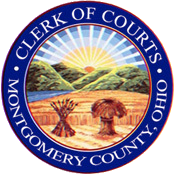
Montgomery County Municipal Court
William C. Cox, Presiding and Administrative Judge
Brandon S. Myers, Judge
Mike Foley, Clerk of Courts
LIMITED TERRITORIAL JURISDICTION
Cities: Trotwood and Brookville
Townships: Clay, Jackson, Jefferson and Perry
Villages: New Lebanon, Phillipsburg, Farmersville and Verona
875 E Main St
Trotwood, OH 45426
Click for Directions
937-687-9099
Fax: 937-854-0244
Monday-Friday
8:00 AM - 4:00 PM
Closed Saturdays, Sundays and National Holidays
Jury Service
Why is jury service so important?
When you are called to be a juror, you become a very important person in our legal system. In the United States, our justice system is based on the belief that a just and fair result in court comes from having disputes settled by our fellow citizens. Very few of us ever have to go to court as plaintiffs or defendants, but when we do, we want good, honest people to listen to the evidence and decide our cases fairly.
Therefore, when we are called to serve on a jury, we have an obligation to our fellow citizens to honor the summons and appear at court. Some cases are more important than others, but to the parties involved, their case is very important, and they deserve to have it decided by honest and impartial jurors.
How are jurors selected?
In Ohio, persons are called at random for jury service from the list of registered voters in a court's geographical area. In some counties and in federal courts, the list of registered automobile drivers may be used. Jury trials are held in the United States district courts, the common pleas court of each county, the municipal courts, and in county courts.
What are the requirements for being a juror?
To serve on a jury in a particular court, you must be a bona fide resident of the geographical area served by that particular court. Ohio jurors must be at least 18 years of age and they must not have lost their right to serve on a jury by having been convicted of certain types of crime. Beyond that, everyone is given the opportunity to be a juror, regardless of age (if at least 18), and regardless of occupation. Only members of cloistered religious orders, those physically unable to serve, those who are necessarily absent from the county, those whose spouse or near relative has recently died or is seriously ill, those who would be harmed or would harm the public by serving as a juror, and those who have served on a jury within the same jury year can be exempted from jury service according to state law.
Jurors are compensated for each day that they serve. Compensation varies between counties and is set by the Board of County Commissioners. Some courts also provide free parking for jurors.
What are the different types of juries?
Most jurors will be selected to serve on a "petit jury," one that is selected to hear and decide a particular case. If the case is a criminal trial involving a felony (a more serious type of crime), the law requires 12 jurors. In a civil case, only eight jurors are selected. In municipal and county courts, where misdemeanors (a less-serious level of crime) are brought to trial, juries consist of eight persons. If a trial is expected to last more than a day, some judges have alternate jurors selected in case something should happen to one or more of the original jury panel.
Unlike the petit jury, a "grand jury" hears evidence about crimes and decides whether or not a person should be "indicted" and tried for committing a crime. Also unlike the petit jury, the grand jury does not decide guilt or innocence. If you are summoned to court to be selected for service on a grand jury, you will probably serve for a longer period of time than if you serve on a petit jury.
How long does a juror have to serve?
Courts vary, but you may expect to be "on call" for service during a two- or three-week period, or perhaps longer. Sometimes there is more than one trial during that term of service, and sometimes none. Some courts have telephone messaging systems, allowing prospective jurors to find out if they will be needed the next day.
Most jury trials do not last more than two or three days. It is not uncommon for a jury trial to be completed within the first or second day. On the other hand, a complex trial that involves many witnesses may last for several weeks. Lengthy trials are somewhat rare and prospective jurors are generally advised of the expected length of the trial before they are actually selected. At the end of each day, the jurors are excused to return to their homes, and they return to court the next day if the trial is not over. In rare cases where the judge believes there is a risk that jurors might be contacted by outsiders about the case, jurors may be "sequestered," or separated from others while the trial is going on, generally in a hotel paid for by the court.
What happens when I appear for jury service?
When you arrive at the court, you are directed to a particular courtroom or to a meeting area. Some courts provide a brief orientation talk or video to help acquaint you with the system. All prospective jurors take an oath or affirm that they will answer truthfully questions posed to them by the judge and the attorneys during the selection process.
The purpose of the questions is to find out if there is some reason why it might be difficult for a prospective juror to be fair and impartial in the case to be tried. As a prospective juror, you are introduced to the parties and the attorneys in the case and given a list of probable witnesses. If you have some relationship to one of these persons, it might be difficult for you to consider the case impartially, and you will likely be excused from jury service.
You are also told a little bit about the facts of the case so that the court can determine if any past experience or prejudice might make it hard for you to be fair. You also have an opportunity to tell the court about anything else that might impact your ability to sit as a juror, including health problems, employment situations, and other obligations in your life. You have the right to respond to questions confidentially to the judge and attorneys, if you wish. Obviously, you must be truthful.
Generally, each side in a case has the right to ask that a certain limited number of jurors be excused without giving a reason (called a "peremptory challenge"). Each side also can make an unlimited number of challenges "for cause" (for a good reason). When attorneys make these "challenges," it is not their intent to personally attack potential jurors, but to ensure that they engage jurors who can evaluate the case as fairly as possible for their clients.
Is it possible that I might report for jury service but not sit on a jury?
Yes. The parties involved in a case usually try to settle their differences and avoid the time and expense of a trial. Sometimes a case is settled only minutes before the trial begins. Therefore, even though many trials are scheduled each day, some of them will not actually go to trial, so those cases will not need juries. But your time spent waiting to serve is not wasted; your presence encourages settlement.
What rules do jurors have to follow?
After the jury has been selected, the jurors must stand and take an oath or affirm that they will "well and truly" try the particular case for which they have been chosen, that they will wait until all the evidence has been heard before making up their minds, and that they will follow all of the judge's instructions.
Jurors must pay attention throughout the trial and do their best to determine the credibility of each witness. Jurors are not permitted to discuss the case among themselves or with anyone else until all the evidence has been presented, the attorneys have made their closing arguments, and the judge has instructed the jurors about the law that applies to the case. Jurors may not do any independent investigation of the matters involved in the lawsuit, and they may not discuss the case with anyone outside the courtroom until after they have deliberated in the jury room and arrived at a verdict. Even then, they don't have to discuss the case with anyone, although they are allowed to do so after the case has been decided.
How does a jury decide a case?
After the attorneys have presented their evidence and made their closing arguments, the judge instructs the jurors about the laws that apply to the case. Jurors must decide cases based on the laws as they are and not as the jurors might like them to be.
Following this instruction, the jury goes to the deliberation room to consider the case and reach a verdict. The jury first elects a foreperson who sees to it that discussions are conducted in a sensible and orderly fashion, that all issues are fully and fairly discussed, and that every juror is given a fair chance to participate. If the jurors have a question during their deliberation, they may write it down and ask the bailiff to deliver it to the judge.
When a verdict has been reached, the jurors agreeing to the verdict sign a form and notify the bailiff. The verdict is read by the clerk and the judge dismisses the jurors.
How many jurors must agree on a verdict?
The type of case determines the number of jurors who must agree on a verdict.
A civil case is usually between two or more persons, companies or corporations who have a dispute concerning money or property. The party suing for compensation is called the "plaintiff." The party being sued is called the "defendant." In a civil case, jurors must decide if and/or how to compensate the plaintiff for any damages. In civil cases, six jurors (three-fourths of the eight jurors) must agree on a verdict.
In a criminal case, the "defendant" is a person charged with a crime. A crime is a violation of a law enacted by the legislature to protect our basic rights. Because crimes are considered acts against the state, and because the state is responsible for legally enforcing the laws of the people, the State of Ohio prosecutes these cases as the "plaintiff." In a criminal case, 12 jurors must determine if an accused person is guilty or not guilty of a charge, and the verdict must be unanimous.
What are the benefits of serving on a jury?
It is understandable that persons may be apprehensive about being called for jury duty. They may fear that their time will be wasted or that the experience will be very negative. However, most jurors find that the experience is positive. They have the opportunity to learn a great deal about the legal system and about the particular subject matter of the lawsuit. They also may make some good friends during the course of their service.
Court officials are careful to treat jurors courteously and professionally. They know how important jurors are to the task of achieving fair and just results for those who come before the court. The benefits to individuals who serve as jurors are significant, but most significant are the benefits of jury service to the entire community.
This factsheet is intended to be reproduced by lawyers and others for free distribution to the public.
It may not be reproduced commercially for sale at a profit.
Justice is Hard Work · Ohio State Bar Association
 CLERK OF COURTS WEBSITE
CLERK OF COURTS WEBSITE